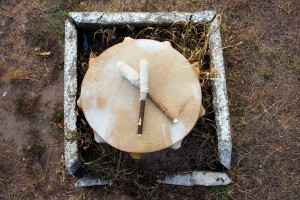Our Lady Showered the People with Abundance
“I have heard their prayers. Assure them that as of this day, their suffering has come to an end.”
There is a town located in Italy called Cursi. It is in the Apulia region of southeast Italy, and if you look at the map of the country, it is located on the heel of the boot. It is about as far southeast one can go before coming to the Adriatic Sea. In the seventeenth century, the Blessed Virgin came to this town and, reaching out with love and tenderness, saved all the people.
It had been three years since a drop of rain had fallen in the region. It was now 1641, and the summer heat was turned up full. The drought had led to famine, and the famine led to a lack of work. Sickness had erupted and began to spread among the people. Things had become genuinely desperate, and even water to drink was getting scarce. The people had been praying every day to the Blessed Mother for help, but no relief appeared.
In April of 1641, (the actual date is unknown) the son of a cattle farmer, Biagio Natali, was out herding some stray cattle back to the farm. Near the pasture was a chapel that had been dedicated to Our Lady. Next to the chapel, near the edge of the road, was a barn. Inside the barn, on one of the walls, was a fresco someone had painted (artist unknown) of the Madonna and Child.
As Biagio passed by the barn, he noticed a strange light coming from inside. He stopped and looked, and the light seemed to get brighter and brighter. Suddenly, the figure of the Mother and Child came from inside the light. Biagio fell to his knees and a beautiful voice said, “Don’t be afraid. I am the Queen of Heaven. Return to your village and try to placate your neighbors. I have heard their prayers. Assure them that as of this day, their suffering has come to an end. As a sign of my protection, you will have an abundant harvest.”
Realizing that the Madonna and Child were no longer there, Biagio got up and ran to Don Giovanni Domenico Coccioli, the parish priest. Don Giovanni was overjoyed to hear this message. He told Biagio that he had received a similar dream. The priest was so excited to hear Biagio’s story that he immediately ran out to announce the news to the people of the city. He organized them into a procession and all the townsfolk began marching while praying and singing in honor of Our Lady and Child. What an incredible faith the people had; nothing had yet to happen.
As the people processed toward the sight of the apparition, the clear, blue sky began to cloud over. The clouds grew darker, and the rains came down. The rain poured down for three days and nights with the fields soaking up every drop of the precious water. Since it was only April, the harvest that year was abundant. The famine ended, and the local granaries and cellars were filled with wheat and fruit.
The people of Cursi wanted to find a way to show their sincere gratitude to the Blessed Mother. They decided to enclose the small chapel and barn within a large church that would surround it. The fresco would be saved within the new church and hopefully become a place of pilgrimage. The church was finished in 1650 and, as hoped for, immediately became a popular place to visit. It was called the Sanctuary of Our Lady of Abundance. Biagio left his work as a farmer, donned the clothes of a hermit, and vowed to spend the rest of his life in prayer and fasting while looking after the shrine.
Some years after the new church was built, it was hit by lightning and burned down. A bigger and more beautiful church was built with a magnificent sanctuary. In the sanctuary, above the high altar, is a Greco-Byzantine fresco of the Madonna of Abundance (sometimes called the Madonna of Prosperity). In it, the Blessed Virgin holds the Divine Infant and in their hands, they are holding sprigs of olives and ears of corn.
The Shrine is not only known for the “abundance” of rain but it is also a place for nursing mothers who lack the necessary milk to nurse their babies. Those who invoke her intercession are said to often develop an abundance of milk.
The shrine in Cursi is opened daily and Mass is offered at 5:00 p.m. in the winter and at 6:00 p.m. in the summer, with the Rosary preceding Mass.
Copyright 2022 LarryPeterson


 So we come back to the little shepherd boy. I hear his drums, “pa rum pa pum pum” a physical declaration of his heart beating with love for the king, a testimony to all that is required of us–offering our own hearts without reserve.
So we come back to the little shepherd boy. I hear his drums, “pa rum pa pum pum” a physical declaration of his heart beating with love for the king, a testimony to all that is required of us–offering our own hearts without reserve. Advent and Christmas were always bright and happy times in my childhood home. While focus was on preparing for the coming of Christ, mixed in with that anticipation was the fun of decorating. Red was everywhere and in every room. My mother made sure our home reflected the joy heralded by the angels of peace on earth and goodwill to all men, with the manger scene a focal point. We had red plaid table cloths in the dining room and playful elves hanging from every conceivable perch. I came to love the significance of all these bright red and green decorating traditions.
Advent and Christmas were always bright and happy times in my childhood home. While focus was on preparing for the coming of Christ, mixed in with that anticipation was the fun of decorating. Red was everywhere and in every room. My mother made sure our home reflected the joy heralded by the angels of peace on earth and goodwill to all men, with the manger scene a focal point. We had red plaid table cloths in the dining room and playful elves hanging from every conceivable perch. I came to love the significance of all these bright red and green decorating traditions.


